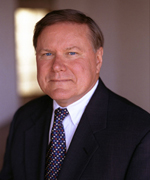
Charles F. Kennel, PhD, chair of the National Academy of Sciences’ Space Studies Board, will deliver the fourth annual Robert M. Walker Distinguished Lecture at 7 p.m. Wednesday, Oct. 19, in Room 100, Whitaker Hall, at Washington University in St. Louis.
Kennel will discuss “Managing Climate Risk: Precarious Decades Ahead” during the free lecture that is open to the public.
“Will we be able to avoid major climate change in our children’s lifetimes?” Kennel asks.
The answer is no, he says. In fact, we’re doing worse than expected.
“The climate is further from stabilization than we thought just a few years ago,” Kennel says. “Carbon dioxide emissions and sea level are rising faster than the ‘business as usual’ projections made by the Intergovernmental Panel on Climate Change in 2007. Significant climate change appears inevitable, but we do not know how much.
“Can we ease our growing climate risk while we wait for carbon dioxide mitigation to take hold?” Kennel asks.
“We have to be realistic about carbon dioxide mitigation,” he says. “It may conceivably be feasible in an engineering sense to make the needed reductions in carbon dioxide emissions by mid-century if there is an all-out deployment of low-carbon energy technologies. Even so, it will take several decades more for the climate to respond fully.”
Thus, he concludes, we are in for “some precarious decades,” and all the more so because “air pollution has been protecting us from two-thirds of the warming expected from our present concentrations of greenhouse gases,” he says.
Engineering and climate science can chart a safe path through the precarious decades, Kennel says. But prudent risk management requires that we have a backup plan that we can turn to if we fail to stay on the path.
And for this reason he will conclude with a discussion of climate engineering, schemes for large-scale engineering of our environment to counteract the effects of changes in atmospheric chemistry.
Kennel earned a bachelor’s degree in astronomy from Harvard College and a doctorate in astrophysical sciences from Princeton University.
He joined the University of California, Los Angeles, (UCLA) Department of Physics, pursued research and teaching in space plasma physics and astrophysics, chaired the department, and eventually became the UCLA executive vice chancellor, its chief academic officer.
From 1994-96, Kennel was associate administrator at NASA and director of Mission to Planet Earth, the world’s largest Earth science program. Kennel’s experiences at NASA convinced him of the growing importance of Earth and environmental science, and he decided to devote the rest of his career to these and related fields.
He became the ninth director of Scripps Institution of Oceanography and vice chancellor of Marine Sciences at the University of California, San Diego (UCSD), serving from 1998-2006.
Kennel was founding director of the UCSD Environment and Sustainability Initiative. He is a distinguished professor, emeritus, of atmospheric sciences at Scripps, senior strategist for the UCSD Sustainability Solutions Institute, and leads the University of Cambridge/UCSD Global Water Initiative.
Washington University’s McDonnell Center for the Space Sciences in Arts & Sciences is sponsoring the lecture as part of the Robert M. Walker Distinguished Lecture Series in memory of Robert M. Walker, PhD, the center’s inaugural director from 1975-1999.
Walker was a pioneering physicist who played a decisive role in shaping research in the space sciences, not only at the university but also worldwide, according to Ramanath Cowsik, PhD, professor of physics and director of the McDonnell Center.
The McDonnell Center, which was established in 1975 through a gift from the aerospace pioneer James S. McDonnell, is a consortium of WUSTL faculty, research staff and students coming primarily from the departments of Earth & Planetary Sciences and Physics, both in Arts & Sciences, who are working on the cutting edge of space research.
“The center’s activities have projected Washington University as a leading institution for research in a wide range of fields like gravitation, cosmology, modern astronomy and planetary sciences,” Cowsik says.
Kennel also will deliver a colloquium, titled “NASA at Mid-Life: The Future of Human Space Exploration,” as part of the lecture series, at 4:15 p.m. Thursday, Oct. 20, in Room 203, Earth and Planetary Sciences. Refreshments will follow the colloquium. The colloquium and reception also are free and open to the public.
The U.S. Senate has asked the Space Studies Board, which Kennel leads, and the Aeronautics and Space Engineering Board to study the goals and technical requirements of human exploration beyond low-earth orbit after 2020. At the colloquium, Kennel will give his thoughts about the evolution in philosophical and management thinking needed to make the leap from the Apollo era to the middle of the 21st century.
After his remarks, he will welcome suggestions from the audience for overarching goals inspiring enough to motivate an enduring commitment to human space exploration.
For more information on the talks, contact Trecia Stumbaugh either at trecia@WUSTL.EDU or (314) 935-5332.